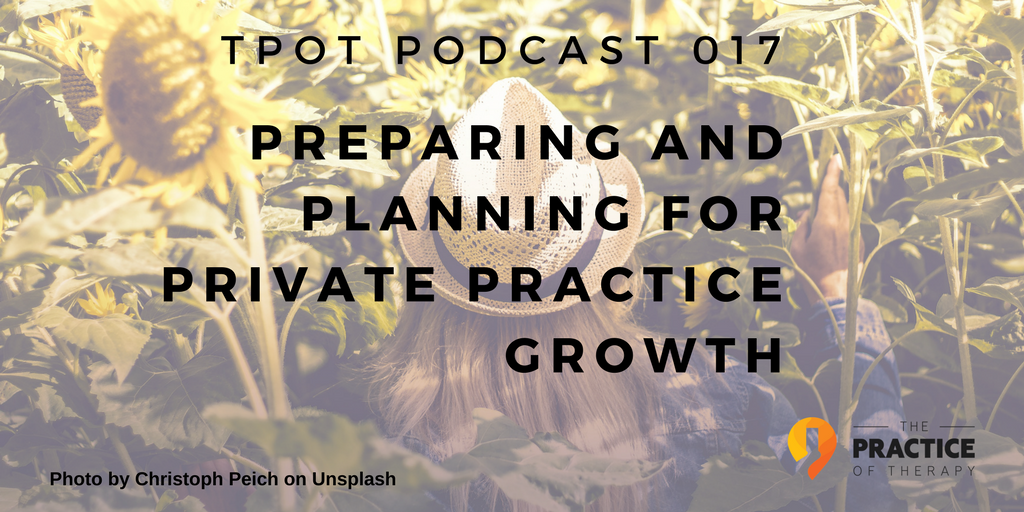In this episode of the Practice of Therapy Podcast, Gordon talks about how to plan and prepare for private practice growth. Knowing your “numbers”, getting the support you need, outsourcing and automating tasks are essential parts of having successful growth and taking your practice to the next level. Whether you are just starting into private practice or already have a practice and thinking about adding other clinicians, it is important to understand the costs or overhead of being in practice. Gordon talks about value of drawing on the support of a mastermind group or coaching. Gordon also discusses why outsourcing and learning to automate things more will give a better return on your time investment.
Your Time is Your #1 Asset
As therapists, our time and expertise are our most important assets. So it is a good idea to have a good idea and handle on how you spend your time.
Hack: Create a simple spreadsheet broken down into 15 min intervals for each day of the week. You can download a free copy of that time tracker here. You could also color code each task just to give more of a visual of how you are spending your time.
Ideally, you want to be able to get the maximum amount of money for your time. Typically the way we do this in private practice is to charge as much as you can for sessions. Also, having the client base to get the number of sessions you want to have.
Know Your Numbers
You need to know what to charge for your time and you need to take the cost of being in business into consideration. In setting fees, it is helpful to “work backwards”. The place that makes sense to start is to first look at where you need to be financially to have a comfortable salary AND cover your expenses (overhead).
Assume you want to make $50,000 salary a year. So let’s start with that figure and work backwards.
$50,000 ÷ 52 weeks = $961.54 income per week needed.
But you would probably want to take some vacation time in there. So let’s divide by 48 weeks of course which gives you four weeks off.
$1041.00 income per week needed.
So, you also need to think about overhead or expenses.
Here are some hypothetical monthly expenses to think about:
- Rent $500
- Phone, Internet, and Electric $200
- Advertising $100
- Insurance, Licensing, etc. $130
- Other office expense $300
- Self-Employment Tax (15.3%) $637
Total Monthly Expenses $1867.00 x 12 = $22,404.00 yearly expense.
What this means is that you will need to bring in a total of $72,404.00 (gross income) to have a salary (take home pay or net income) of $50,000.00.
How this translates into session rates
$72,404.00 divided by 48 weeks is $1508.42 per needed. Say you set a session rate of $100 per session. You would need to have around 15 sessions per week ($1508.42 divided by $100). So in this example in order to make $50,000.00 a year you would need to charge:
$150 per session and have 10 sessions per week, or
$90 per session and have 17 sessions per week, or
$70 per session and have 22 sessions per week
As you can see, the more you charge the fewer number of sessions it takes to meet your targeted income. And conversely, the more sessions you have the more you will bring in regardless of what you charge.
Hidden Costs
One area that many clinicians overlook are the hidden costs of running a practice. Things like, health insurance, disability insurance, and taxes can really catch people off-guard. Here’s a blog post on that mentioned in the podcast: https://practiceoftherapy.com/hidden-costs-private-practice/
Outsourcing Is Key To Growth
Learn to hand-off tasks and things to others so that you can spend your time doing things that will actually bring in money. Hiring a virtual assistant is a good way to maximize your time.
Thought: If you are spending an hour or more returning phone calls and following up with referrals, a virtual assistant would absolutely pay for themselves. If you could free that time for seeing just one more client, it would pay for itself.
Outsourcing does require a mindset shift. One “thinking mistake” we make as practice owners is that we feel we are the only ones that can do things. Or we think we can do it best… By outsourcing we free up our time to do the things that truly require our expertise.
Automate More
A good way to learn to automate is to map out or write down the steps of tasks you routinely do. Create templates so that you do not have to spend as much time recreating things. For example, have an email template you can use for the things you have to respond to regularly; like client referrals.
Knowing your numbers and being able to maximize your time are the keys to having successful private practice growth. Ultimately your time and expertise are your number one assets.
Other resources mentioned:
Apply for a Mastermind Group: https://practiceoftherapy.com/mastermind-group/
G-Suite of Therapists E-Course: https://practiceoftherapy.com/g-suite-for-therapists/
The Paperwork Packet: https://practiceoftherapy.com/paperwork-packet/
(Discount Code for $20 off: PWPOT17 –good till 12/31/17)
Meet Gordon Brewer, MEd, LMFT
Gordon is the person behind The Practice of Therapy Podcast & Blog.He is also President and Founder of Kingsport Counseling Associates, PLLC. He is a therapist, consultant, business mentor, trainer and writer. PLEASE Subscribe to The Practice of Therapy Podcast on iTunes, Stitcher and Google Play. Follow us on Twitter @therapistlearn and Pinterest “Like” us on Facebook.


